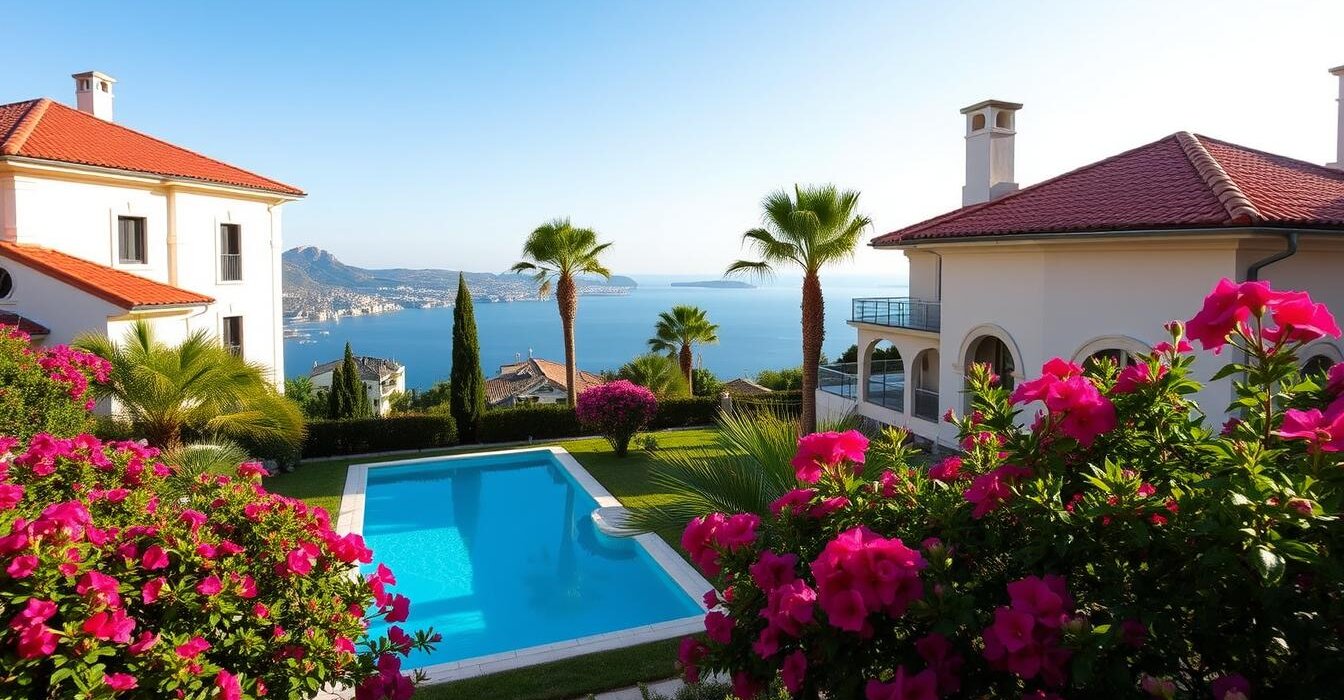As a licensed real estate agent in Turkey since 2006, I’ve had the pleasure of helping over 1,600 foreign buyers find their perfect investment or holiday home in Antalya. With its booming economy and favourable climate, Turkey’s real estate market presents attractive opportunities for foreign investors.
Table Of Content
- Key Takeaways
- Understanding the Antalya Real Estate Market
- Overview of Market Trends
- Types of Properties Available
- Why Choose Antalya for Villa Purchase?
- Climate and Lifestyle Benefits
- Cultural Attractions and Activities
- Steps to Buying Property in Antalya
- Researching the Market
- Setting a Budget
- Legal Considerations for Foreign Buyers
- Understanding Turkish Property Laws
- Necessary Documentation and Regulations
- Financing Your Villa Purchase in Turkey
- Mortgage Options for Foreign Buyers
- Currency Exchange Considerations
- Finding a Reliable Real Estate Agent
- Qualities to Look For in an Agent
- Questions to Ask Potential Agents
- The Buying Process Explained
- Making an Offer on a Property
- Property Inspection and Valuation
- Understanding Additional Costs
- Closing Costs and Fees
- Maintenance Fees and Taxes
- Residence Permits for Property Owners
- Types of Residence Permits Available
- Application Process
- Tips for a Successful Purchase
- Negotiation Strategies
- Handling Language Barriers
- Post-Purchase Considerations
- Managing Your Property from Abroad
- Short-Term Rental Opportunities
- Enjoying Your New Home in Antalya
- Settling into the Local Community
- Exploring Surrounding Areas and Attractions
- FAQ
- Is Antalya a good place to buy property?
- Can foreigners buy property in Antalya?
- Which city in Turkey is best to buy property?
- How much is the tax for buying a property in Turkey?
- What are the benefits of buying property in Antalya for foreigners?
- Are there cheap houses for sale in Antalya, Turkey?
- Can I buy a beach house in Antalya?
- What is the process of buying a property in Antalya?
- How do I manage my property in Antalya from abroad?
- Can I rent out my property in Antalya on a short-term basis?
Did you know that Antalya has become a hotspot for international property buyers? The region’s stunning natural beauty, rich history, and modern infrastructure make it an ideal destination for those seeking a holiday home or a lucrative investment opportunity.
Key Takeaways
- Expert guidance on buying properties in Antalya
- Valuable insights into Turkey’s real estate market
- Tips for making a successful investment
- Overview of the process of buying property in Antalya
- Information on Antalya real estate for sale
Understanding the Antalya Real Estate Market
As a licensed real estate agent in Turkey since 2006, I’ve witnessed firsthand the remarkable growth of Antalya’s property market. The Turkish real estate market has grown significantly in recent years, driven by a strong economy and increasing foreign investment. This growth has been particularly pronounced in Antalya, a city renowned for its natural beauty, rich history, and vibrant culture.
Overview of Market Trends
The Antalya real estate market is characterized by its diversity, with properties ranging from modern apartments to luxury villas. Market trends indicate a steady demand for properties in Antalya, particularly among foreign investors. The city’s appeal lies in its attractive lifestyle options, including its Mediterranean climate, beautiful beaches, and historical sites.
Recent data shows that Antalya continues to attract a significant number of property buyers, both domestic and international. The market is influenced by factors such as government policies supporting foreign investment, the availability of various property types, and the overall economic stability of Turkey.
Types of Properties Available
Antalya offers a wide range of properties for sale, catering to different preferences and budgets. Buyers can choose from:
- Modern apartments in city centers or near tourist attractions
- Luxury villas with private pools and gardens, often located in gated communities
- Historic properties that offer a unique blend of traditional architecture and modern amenities
- New developments and complexes that provide a range of facilities, including swimming pools, gyms, and security services
Whether you’re looking for a house for sale in Antalya or a flat for sale in Antalya, the market has something to offer. It’s essential to research thoroughly and consider factors like location, property condition, and potential for rental income or capital appreciation.
Why Choose Antalya for Villa Purchase?
Antalya offers a unique blend of natural beauty and modern amenities, making it an ideal villa purchase destination. I’ve seen many investors drawn to its picturesque landscapes, rich cultural heritage, and pleasant climate.
Climate and Lifestyle Benefits
One of the primary reasons Antalya stands out is its favourable climate. With over 300 days of sunshine annually, it’s an ideal location for those seeking a warm and sunny lifestyle. The Mediterranean climate means mild winters and warm summers, perfect for enjoying the beautiful beaches and outdoor activities year-round.
The lifestyle in Antalya is relaxed and welcoming, making it easy for foreigners to integrate into the local community. Here are some benefits:
- Year-round outdoor activities: Enjoy hiking, water sports, or simply relaxing on the beach.
- Modern amenities: Antalya boasts modern shopping malls, restaurants, and healthcare facilities.
- Cultural events: Participate in local festivals and cultural events that take place throughout the year.
Cultural Attractions and Activities
Antalya is not just about beautiful beaches; it’s also rich in history and culture. The city is home to numerous historical sites, museums, and cultural landmarks. Some must-visit attractions include:
- The ancient city of Perge
- The Antalya Museum, which houses a vast collection of artefacts from the region
- The historic Kaleiçi district, with its narrow streets and historic homes
These cultural attractions, combined with the natural beauty of the area, make Antalya a compelling choice for villa purchases. Whether you’re looking to invest in beach houses for sale in Antalya or property for sale in Antalya Lara Beach, there’s something for everyone.
Steps to Buying Property in Antalya
As a licensed real estate agent in Turkey since 2006, I’m excited to guide you through the process of buying property in Antalya. With my experience, you’ll be able to make informed decisions and avoid potential pitfalls.
Buying property in Antalya can be a rewarding experience, whether you’re looking for a holiday home, a rental investment, or a peaceful retirement destination. To ensure a smooth transaction, it’s essential to follow the right steps.
Researching the Market
Researching the Antalya real estate market is a crucial step in finding the right property. You should consider factors such as location, property type, and budget. For instance, if you’re looking for cheap houses for sale in Antalya, you may want to explore areas outside the city centre.
- Neighbourhoods and their characteristics
- Property prices and trends
- Amenities and services available
Setting a Budget
Setting a realistic budget is vital to finding the right property in Antalya. You should consider not only the purchase price but also additional costs such as notary fees, taxes, and maintenance costs.
If you’re looking for an affordable peaceful property in Antalya, you may want to consider properties in quieter areas or those with a more relaxed atmosphere.
“The key to a successful property purchase is careful planning and research. By setting a realistic budget and understanding the market, you can find your dream home or investment opportunity.”
By following these steps and doing your research, you can ensure a successful and stress-free property purchase in Antalya.
Legal Considerations for Foreign Buyers
Buying property in Turkey as a foreigner involves several legal considerations that must be addressed. As a licensed real estate agent in Turkey since 2006, I have guided numerous international clients through the process, ensuring compliance with Turkish property laws.
Turkish law permits foreigners to purchase property, but certain restrictions and regulations apply. It’s essential to understand these laws to avoid any complications during or after the purchase.
Understanding Turkish Property Laws
Turkish property laws are governed by the Land Registry Law and the Law on Ownership of Real Estate by Foreigners. These laws outline the procedures and restrictions for foreign property ownership.
Some key aspects of Turkish property laws include:
- Foreigners can buy freehold property, including apartments and villas.
- There are restrictions on buying property in certain military zones and areas designated for environmental protection.
- Foreigners must obtain permission from the relevant authorities before purchasing property.
Necessary Documentation and Regulations
To buy property in Turkey, foreigners need to provide specific documents, including:
- A valid passport.
- A Turkish Tax Identification Number.
- Proof of address.
The purchase process involves several steps, including:
- Signing a preliminary sales agreement.
- Obtaining necessary permissions from Turkish authorities.
- Registering the property at the Land Registry Office.
Here’s a summary of the key documentation and regulations:
| Document/Regulation | Description | Requirement |
|---|---|---|
| Valid Passport | Proof of identity | Mandatory |
| Turkish Tax Identification Number | For tax purposes | Mandatory |
| Proof of Address | Utility bill or bank statement | Mandatory |
| Permission from Authorities | For certain restricted areas | Conditional |

Understanding these legal considerations is crucial for a smooth property buying experience in Turkey. I recommend consulting with a reputable real estate agent and legal advisor to ensure compliance with all regulations.
Financing Your Villa Purchase in Turkey
As a licensed real estate agent in Turkey since 2006, I can guide you through the financing process for your villa purchase. Financing your villa purchase in Turkey requires careful consideration of the available options.
Mortgage Options for Foreign Buyers
Foreign buyers can obtain a mortgage in Turkey, but the terms and conditions may vary. Typically, the mortgage can cover up to 50% of the property’s purchase price, with repayment terms ranging from 5 to 10 years. Interest rates are generally competitive, but it’s essential to shop around and compare offers from different banks.
| Bank Name | Maximum Loan Percentage | Repayment Term | Interest Rate |
|---|---|---|---|
| Bank A | 50% | 5-10 years | 6%-8% |
| Bank B | 40% | 5-7 years | 7%-9% |
| Bank C | 50% | 10 years | 6.5%-8.5% |
When considering a mortgage, it’s crucial to understand the eligibility criteria, which often include a stable income, a good credit score, and a significant down payment.
Currency Exchange Considerations
Currency exchange is another vital aspect to consider when financing your villa purchase in Turkey. Fluctuations in exchange rates can significantly impact your purchase price and mortgage repayments.
“Exchange rate fluctuations can affect the total cost of your property purchase and ongoing mortgage payments.”
To mitigate this risk, some buyers opt for currency exchange services that offer fixed rates or hedging options. It’s also advisable to consult with a financial advisor to determine the best strategy for your situation.
Finding a Reliable Real Estate Agent
A reliable real estate agent can make all the difference in your Antalya property purchase journey. As someone who has been guiding international clients through the Turkish real estate market since 2006, I can attest to the importance of having the right professional by your side.
When searching for a real estate agent, there are several key qualities to look for. These include a strong understanding of the local market, excellent communication skills, and a proven track record of successful transactions.
Qualities to Look For in an Agent
A good real estate agent should possess certain qualities that set them apart from others. Some of the key attributes to look for include:
- Local Market Knowledge: An agent with in-depth knowledge of the Antalya real estate market can provide valuable insights and guidance.
- Language Skills: The ability to communicate effectively in your native language can significantly enhance your experience.
- Professional Affiliations: Membership in reputable real estate associations can indicate a commitment to ethical standards and best practices.
Questions to Ask Potential Agents
To ensure you find the right agent for your needs, it’s essential to ask the right questions. Some examples include:
- What experience do you have working with international clients?
- Can you provide references or testimonials from previous clients?
- How do you stay up-to-date with changes in the local real estate market?
| Criteria | Agent 1 | Agent 2 |
|---|---|---|
| Local Market Knowledge | Excellent | Good |
| Language Skills | English, German | English |
| Professional Affiliations | REALTOR, Turkish RE Association | Turkish RE Association |
By carefully evaluating potential agents based on these criteria and asking the right questions, you can find a reliable partner to guide you through the process of buying property in Antalya.
The Buying Process Explained
As a licensed real estate agent in Turkey, I’ll walk you through the buying process in Antalya, ensuring you’re well-informed every step of the way.
Making an Offer on a Property
When you’ve found a property for sale in Antalya Lara Beach or elsewhere in the region that suits your needs, the next step is to make an offer. This involves negotiating the price and terms of the sale. It’s essential to research the local market to determine a fair price. Consider factors such as the property’s condition, location, and comparable sales in the area.
Here’s a general outline of the steps involved in making an offer:
- Determine your budget and stick to it.
- Research the market value of the property.
- Consider working with a real estate agent to help negotiate.
- Be prepared to negotiate the terms of the sale.
Property Inspection and Valuation
Once your offer is accepted, it’s crucial to conduct a thorough property inspection to identify any potential issues. This step can help you avoid costly surprises down the line. You may also want to consider hiring a professional to conduct a valuation of the property to ensure its value aligns with the sale price.
Here’s an example of what a property inspection and valuation report might look like:
| Inspection Criteria | Status | Notes |
|---|---|---|
| Structural Integrity | Satisfactory | No major issues found. |
| Electrical System | Satisfactory | All systems functioning properly. |
| Plumbing | Needs Attention | Some pipes show signs of aging. |
Understanding the buying process, including making an offer and conducting a property inspection, is vital when purchasing a property for sale in Turkey under 50k Antalya or any other property in the region. By being informed, you can make a confident decision and enjoy your new home in Antalya.
Understanding Additional Costs
Understanding the full cost of buying property in Antalya is vital for making an informed decision. As an experienced real estate agent in Turkey, I’ve seen many buyers overlook additional expenses, which can significantly impact their budget.
Beyond the purchase price, there are several costs associated with buying property in Turkey. These include closing costs, maintenance fees, and taxes, all of which are crucial to consider when planning your investment.
Closing Costs and Fees
Closing costs in Turkey typically range between 2% to 4% of the property’s purchase price. These costs cover various fees, including:
- Title deed fees
- Notary fees
- Registration fees
- Other administrative costs
It’s essential to factor these costs into your budget to avoid any unexpected expenses.
Maintenance Fees and Taxes
Maintenance fees, also known as “aidat,” are annual charges that cover the upkeep of communal areas in apartment buildings or developments. These fees can vary depending on the property’s location, size, and amenities.
Additionally, property owners in Turkey are required to pay annual property taxes, known as “emlak vergisi.” The tax rate is determined by the property’s value and location.
| Cost Type | Description | Typical Cost |
|---|---|---|
| Closing Costs | Includes title deed fees, notary fees, and registration fees | 2% to 4% of purchase price |
| Maintenance Fees | Annual charges for communal area upkeep | Variable |
| Property Taxes | Annual taxes based on property value and location | 0.1% to 0.3% of property value |

By understanding these additional costs, you can better plan your investment and ensure a smooth transaction. As a licensed real estate agent in Turkey since 2006, I’m committed to guiding you through the process with transparency and expertise.
Residence Permits for Property Owners
Property ownership in Antalya can be a stepping stone to residency in Turkey, offering a unique lifestyle opportunity. As a property owner, you’re likely considering the benefits of obtaining a residence permit, which can enhance your living experience in this beautiful Turkish city.
Turkey offers various residence permits, and understanding these options is crucial for property owners. The type of residence permit you apply for depends on several factors, including the purpose of your stay and your nationality.
Types of Residence Permits Available
There are several types of residence permits available for property owners in Turkey:
- Short-term Residence Permit: Typically issued for up to one year, this permit is suitable for individuals who own property in Turkey but do not plan to stay long-term.
- Long-term Residence Permit: This permit is ideal for those who intend to reside in Turkey for an extended period. It’s usually issued for a longer duration and can be renewed.
- Family Residence Permit: If you’re married to a Turkish citizen or have family ties in Turkey, you may be eligible for this type of permit.
Each type of residence permit has its own set of requirements and application process. It’s essential to determine which category you fall into to ensure a smooth application process.
Application Process
The application process for a residence permit involves several steps:
- Prepare the necessary documents, including a valid passport, proof of property ownership, and health insurance.
- Submit your application at the relevant Turkish authorities, either in person or through an authorized representative.
- Pay the required application fee.
- Wait for the processing of your application, which may take several weeks or months.
It’s advisable to consult with the relevant authorities or a professional to ensure you’re meeting all the requirements and following the correct procedure.
Obtaining a residence permit as a property owner in Antalya not only enhances your lifestyle but also provides a sense of security and belonging in your new home. I recommend exploring this opportunity further to make the most of your investment in Turkey.
Tips for a Successful Purchase
To secure your dream property in Antalya, you need to be well-informed and strategic. As a licensed real estate agent in Turkey since 2006, I’ve guided numerous international investors through the process, and I’m excited to share my expertise with you.
Negotiation Strategies
Negotiation is a crucial aspect of buying property in Antalya. To get the best deal, consider the following:
- Research the local market to understand fair prices for properties like affordable peaceful property Antalya.
- Be prepared to make an informed offer based on your research.
- Don’t be afraid to walk away if the terms aren’t right.
Handling Language Barriers
Language barriers can sometimes complicate the buying process. To overcome this:
- Work with a reputable real estate agent who speaks your language.
- Consider hiring a translator for key negotiations.
- Take the time to understand the contract and ask questions.
By being prepared, negotiating effectively, and handling language barriers, you can successfully purchase your ideal property in Antalya, whether it’s in the historicAntalya Old Townor elsewhere in the region. With the right guidance and knowledge, you’ll be enjoying your newAntalya real estate for salein no time.
Post-Purchase Considerations
As a foreign property owner in Antalya, you’ll need to consider several post-purchase factors to ensure your investment remains valuable and profitable.
Managing Your Property from Abroad
Managing your property from abroad can be challenging, but there are several options available to make it easier. You can appoint a property management company to handle day-to-day tasks, such as maintenance and rent collection.
Here are some benefits of using a property management company:
- Local expertise and knowledge
- Regular property inspections
- Rent collection and accounting
- Maintenance and repair services
When selecting a property management company, look for one with experience in managing properties in Antalya, particularly in areas like Lara Beach, where property for sale in Antalya Lara Beach is highly sought after.
| Service | Description | Typical Cost |
|---|---|---|
| Property Inspections | Regular visits to ensure the property is well-maintained | £50-£100 per visit |
| Rent Collection | Handling rent payments and accounting | 5-10% of rental income |
| Maintenance Services | Arranging repairs and maintenance work | Variable costs |
Short-Term Rental Opportunities
Antalya is a popular tourist destination, making it an attractive location for short-term rentals. You can rent your property out on platforms like Airbnb or through local real estate agents.
Here are some benefits of short-term rentals:
- Higher rental income potential
- Flexibility to use the property yourself
- Opportunity to experience the local rental market
When considering short-term rentals, be aware of the local regulations and tax implications. It’s also essential to furnish and equip your property to a high standard to attract guests.
By understanding the options available for managing your property and exploring short-term rental opportunities, you can make the most of your investment in Antalya.
Enjoying Your New Home in Antalya
As you settle into your new home in Antalya, you’ll discover a rich cultural heritage and a wide range of attractions to enjoy. With its stunning landscapes, historic sites, and vibrant culture, Antalya is an ideal location for property investment, whether you’re considering Antalya real estate for sale or looking into property for sale in Antalya.
Settling into the Local Community
To truly enjoy your new home, it’s essential to integrate into the local community. Attend local events, visit nearby markets, and get to know your neighbours. This will not only enhance your living experience but also provide opportunities to learn about the local culture and way of life.
Exploring Surrounding Areas and Attractions
Antalya is surrounded by numerous attractions, from ancient ruins to beautiful beaches. Exploring these areas will help you appreciate the region’s history and natural beauty. If you’re wondering “Is Antalya a good place to buy property?”, the answer lies in the lifestyle and opportunities it offers. With its unique blend of traditional and modern living, Antalya is an excellent choice for investors and homeowners alike.
FAQ
Is Antalya a good place to buy property?
Yes, Antalya is an excellent choice for buying property due to its thriving real estate market, beautiful landscapes, and rich cultural heritage. With a wide range of properties available, from luxury villas to affordable apartments, Antalya offers something for every investor and homeowner.
Can foreigners buy property in Antalya?
Yes, foreigners can buy property in Antalya, Turkey. However, it’s essential to understand the Turkish property laws and regulations, as well as the necessary documentation required for a successful purchase.
Which city in Turkey is best to buy property?
Antalya is a popular destination for property investment in Turkey, thanks to its natural beauty, rich culture, and modern amenities. However, the best city to buy property ultimately depends on your personal preferences and investment goals.
How much is the tax for buying a property in Turkey?
The tax for buying a property in Turkey includes various costs such as title deed fees, valuation fees, and notary fees. These costs can vary depending on the property’s value and location. It’s recommended to consult with a real estate expert to understand the total costs involved.
What are the benefits of buying property in Antalya for foreigners?
Buying property in Antalya can offer numerous benefits for foreigners, including the potential for rental income, capital appreciation, and a residence permit. Additionally, Antalya’s beautiful landscapes and rich cultural heritage make it an attractive destination for holiday homes.
Are there cheap houses for sale in Antalya, Turkey?
Yes, Antalya offers a range of affordable housing options, including apartments and houses. The prices vary depending on factors such as location, size, and condition. You can find properties under 50,000 Turkish Lira (£25,000 or ,000 approximately) in some areas.
Can I buy a beach house in Antalya?
Yes, Antalya has a beautiful coastline with many beach houses and apartments available for sale. You can find properties in popular beach destinations like Lara Beach and Konyaaltı.
What is the process of buying a property in Antalya?
The process involves researching the market, setting a budget, finding a reliable real estate agent, making an offer, and completing the necessary paperwork. It’s recommended to work with a licensed real estate agent to ensure a smooth transaction.
How do I manage my property in Antalya from abroad?
You can manage your property from abroad by hiring a property management company to handle tasks such as rent collection, maintenance, and repairs. This way, you can enjoy your property while minimising the hassle of managing it remotely.
Can I rent out my property in Antalya on a short-term basis?
Yes, you can rent out your property in Antalya on a short-term basis, which can be a lucrative way to generate rental income. However, it’s essential to comply with Turkish regulations and obtain any necessary permits.







No Comment! Be the first one.